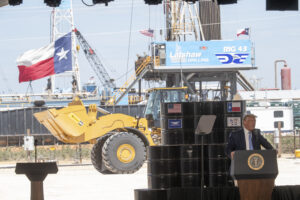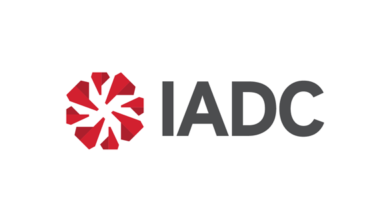Wirelines
President Trump visits Latshaw Drilling Rig #43 during visit to Permian Basin

On 29 July, during his Permian Basin trip for a fundraising event, President Donald Trump visited land Rig #43 of Tulsa, Okla.-based IADC member company Latshaw Drilling.
President Trump toured the rig and affirmed his support of the energy industry during the ongoing global pandemic, as well as his efforts to end leasing moratoriums and help the US become a net energy exporter.
In his remarks, President Trump noted that “the US has increased oil production by 3.1 million bbl/day. For the first time in nearly 70 years, we have become a net energy exporter, and the US is now the No. 1 producer of oil and natural gas.”
Latshaw Drilling is one of the largest privately held drilling contractors in the US. Rig #43, a 1,500-hp walking rig, is operating for Double Eagle Energy.
Latshaw Drilling’s Founder and President, Trent Latshaw, received the IADC Drilling Contractor of the Year award in 2018. The award recognizes outstanding lifetime achievements in technical innovation, safety and economic efficiency within the drilling industry.
“President Trump is a strong supporter of the industry, and we are fortunate Double Eagle Energy chose our rig to showcase,” Mr Latshaw said.
IADC, other trades submit letter opposing Amendment that expands GOM moratorium
On 16 July 2020, IADC, alongside several other international energy trade associations, wrote a joint trade letter urging the House Committee on Rules to reject Amendment 151 to H.R. 6395, the National Defense Authorization Act for fiscal year 2021.
The proposed amendment, if enacted, would extend existing Gulf of Mexico Energy Security Act moratorium provisions into the Eastern sector of the US Gulf of Mexico. This would preclude regulators from considering responsible measures that could allow for expanding activities in the Eastern sector. Regulators should be allowed to examine responsible development in the Eastern Gulf of Mexico, the industry urged.
Amendment 151 also would roll back existing safety rules and seek to return to the 2016 Well Control Rule. This would remove government-reviewed regulatory flexibility and endanger the progress and innovations made by the offshore energy sector, the letter stated.
Furthermore, Amendment 151 would undo critical reforms and potentially increase the risk of an incident offshore with requirements on critical aspects of safety, such as well design, well cementing and drilling margins.




